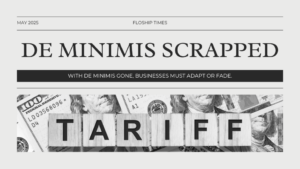Since 1 January 2021, the United Kingdom has enforced new regulations on imported goods and the collection of VAT. This article will be broken into 2 segments, the first are the key changes that your ecommerce business needs to factor in when trading with UK, the second answers the key questions our clients have raised during the first 3 months since the introduction of the regulations.
Before we move on, whilst this article should serve as your starting point to understanding Brexit & the regulatory changes, I strongly recommend for your business to also consult a tax advisor/specialist.
The Most Important Points To Remember
- Abolition of the low value consignment relief which allowed the waiver of VAT on imports below the threshold of 15GBP. This means VAT will be paid in full while duties are applicable above the threshold of 135GBP;
- If the seller is located overseas and not a UK business & the value of goods doesn’t exceed the 135GBP threshold, the responsibility of collecting VAT is shifted from the importer to the point of sales. This means e-commerce sellers will need to charge the VAT at checkout for every order less than 135GBP;
- If the non-UK business sells on a Marketplace, a different policy applies. For order values below 135GBP and placed on Marketplaces, the seller will no longer be responsible for collecting and paying the VAT but, the Marketplace itself will take care of it. Also, if the goods are located outside UK at the point of sales, it doesn’t matter where the businesses or the Marketplaces are located. If goods are sold through a Marketplace and with a value of less than 135GBP, it will still be accountable for the VAT collection;
- Non-UK businesses from overseas will still be responsible for VAT collection of goods already in the UK and sold directly to UK customers through their own e-commerce platform;
- Non-UK businesses from overseas wishing to continue selling to UK customers through their e-commerce platform must apply for a UK VAT number;
- These new arrangements don’t apply to non business sales such as gifts or exchanges between two friends or relatives for example ( consumer to consumer ), goods where an excise duty apply, consignments from Jersey and Guernsey that are already covered by the import VAT scheme;
- An invoice for the applied VAT must be issued to the customer at the checkout when applicable. More information can be found under the VAT record keeping section on UK government website mentioned below;
- If the order is placed before 31st December 2020 but dispatched in the new year, it will NOT be subject to the new regulations as long as the payment and the order placement were made in 2020;
- For goods that are sold above the 135GBP threshold, the general rules apply.
- Any business selling to the UK from overseas must apply for a UK VAT number if the goods are NOT located in the UK at the point of sale. For businesses selling from any EU country, it’s important to remember that the distance selling threshold has been abolished.
- A few more points to pay attention to would be the different VAT rates to apply at the checkout ( Standard = 20%, Reduced = 5%, Zero = 0% ) based on the type of product sold, the presence of the VAT number on the parcel (i.e. on the commercial invoice ), the 135GBP threshold has to be considered as an intrinsic value ( selling price excluding insurance, transportation, VAT etc ), the custom declaration is still required even if the VAT collection is moved from the import to the point of sales
Questions Raised By Floship Clients
Q. Am I using the right incoterm?
A. DDP should be used as an incoterm when sellers are collecting VAT at the point of sales ( check out ). Something you should watch out for is your return rate. By using DDP you will not only cover the VAT but the duties too. Also, any shipping provider such as postal services or express couriers will charge you a handling fee for custom clearance of the goods in DDP. General rates for Royal Mail are GBP8 per package. I highly suggest to update your Terms of Services and confirm with related parties if the duties are refundable by the carrier when there is a returned item in order to avoid any surprise or loss. It is mandatory in the EU to allow customers to return an order within 14 days but it is NOT if you are shipping outside the European Union, in this case, the UK.
Q. Am I using the right HS code?
A. You should make sure the correct HS code is present on the custom declaration, especially for goods over GBP135 ( duty threshold ). If you are unsure of your HS code, you can consider requesting a legally binding decision from HMRC here or, for a less formal classification, here
Q. What else does customs declaration need to be Brexit compliant?
A. The custom declaration needs to include the EORI number ( when fulfilling from EU ), UK-VAT number, country of origin, amount of VAT collected, value per item, item description and HS code at the very minimum when selling to UK customers.
Furthermore, if you are shipping with Postal Services, you would be required to fill those info in the so called CN22/CN23. If you are shipping with an Express Carrier ( like “https://www.dhl.com/en/express/customs_support/customs_paperwork/commercial_invoice.html”>DHL Express ) or with a Freight Forwarder, you would be required to fill in a Commercial Invoice. It may still be possible that the custom will require a Certificate of Origin for your goods.
Q. How do the changes in data protection regulations affect my ecommerce business?
A. Good news is that, for the copyright seems nothing should change since both UK and EU are bonded by the international treaties on copyright. GDPR and the Data Protection Act 2018 will still be retained. Further information can be found here. However, UK is to be considered fully autonomous regarding the data protection policies and I suggest you to verify and cater for any potential change and related impacts on your business with a legal professional.
Subscribe now as in the coming weeks, I will take a deep dive into the new EU ecommerce rule changes that will come in effect from July 2021.

Ready To Upgrade Your Logistic Solution?
Speak to Floship ecommerce logistic consultant about improving your global support chain today




